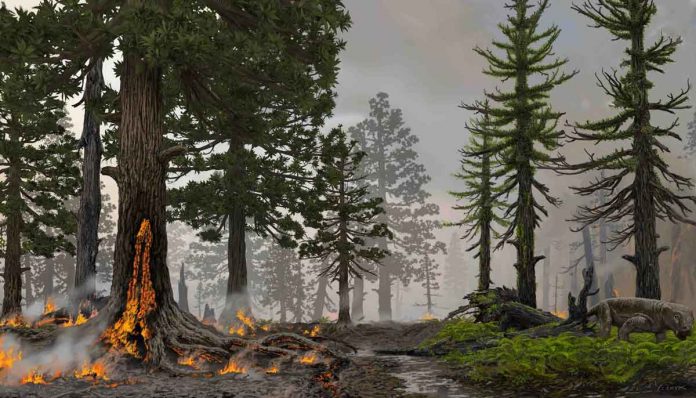Researchers from University College Cork (UCC) and the Swedish Museum of Natural History studied the end-Permian mass extinction (252 million years ago), which wiped out almost every species on Earth and collapsed entire ecosystems. The researchers discovered a significant increase in wildfire activity as a result of this most devastating of mass extinctions. Extreme warming and drying caused by rapid greenhouse gas emissions from volcanoes resulted in wildfires across vast areas that were previously permanently wet. Instead of absorbing carbon from the atmosphere, these wetlands became major sources of carbon in the atmosphere, exacerbating the sharp warming trend. Today, the study was published in PALAIOS.
Fossils discovered in eastern Australia and Antarctica
The researchers discovered that the wetlands were regularly disturbed by fires leading up to the extinction event by studying fossil plant and charcoal records from the Sydney and Bowen basins in eastern Australia and Antarctica (Lambert Graben). In response, the plants developed a variety of fire-fighting mechanisms. However, the extinction event’s severe climate change and peak in fire activity appears to have pushed even these fire-adapted plants over a tipping point, from which the entire ecosystem could not recover for millions of years.
“We discovered a high abundance of burnt, or charcoalified, plants throughout the late Permian Period while sifting through the fossil plant records of eastern Australia and Antarctica. From this high baseline, charcoal abundances peaked right at the top of the last Permian coal beds, indicating a significant but brief increase in wildfires. This was followed by three million years of low charcoal during the Early Triassic Period. End-Permian burnout was followed by an Early Triassic depression “Dr. Chris Mays, Lecturer in Paleontology at University College Cork (UCC) and the study’s lead author, comments.
Is the Earth on the verge of a similar mass extinction?
Wildfires have caused shocking mass animal die-offs in several regions around the world in recent years, according to researchers (e.g., California 2018, 2020, Australia 2019-20). At the same time, our warming global climate has caused prolonged droughts and increased wildfires in typically wet habitats such as Indonesia’s peat forests and South America’s vast Pantanal wetlands. These major ‘carbon sinks,’ or areas of natural carbon captured from the atmosphere, are critical in the fight against climate change. As the fossil record demonstrates, without these carbon-capture regions, the world can remain inhospitable for hundreds of millennia.
“The possibility of wildfires acting as a direct extinction driver during hyperthermal events, rather than as a symptom of climatic change, warrants further investigation. Unlike previous mass extinctions, we now have the opportunity to prevent the burning of the world’s carbon sinks and help avoid the worst effects of modern warming “Dr. Mays makes a comment.

